Publications
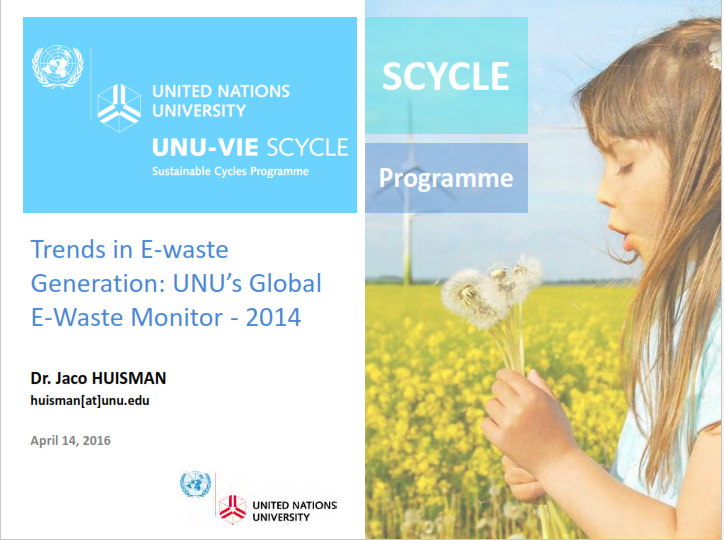
Trends in E-waste Generation: UNU’s Global E-Waste Monitor - 2014
Presentation by Dr. Jaco Huisman, United Nations University
14 April 2016
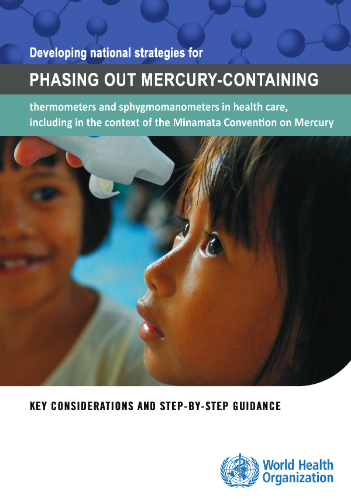
Developing national strategies for phasing out mercury-containing thermometers and sphygmomanometers in health care, including in the context of the Minamata Convention on Mercury: key considerations and step-by-step guidance
World Health Organization, 2015
With the adoption of the Minamata Convention on Mercury in October 2013, clear time-bound targets were set for phasing out the manufacture, export or import of a number of mercury-added products specified in the Convention. For thermometers and sphygmomanometers that are included in a wider category of non-electronic medical devices regulated under Article 4 of the Convention, the phase-out date is 2020, with the possibility of Party-specific exemptions up to 2030. An open-ended exemption is also afforded to products for research, calibration of instrumentation, and for use as a reference standard.
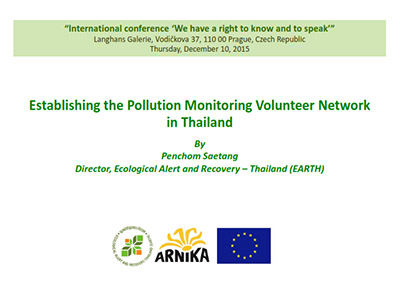
Establishing the Pollution Monitoring Volunteer Network in Thailand
By Penchom Saetang, Director, Ecological Alert and Recovery – Thailand (EARTH), December 2015
Since 1994, communities started their fighting with the government’s industrial investment projects in the eastern, northern, northeaster regions. This situation has prompted growing conflicts and clashes between communities and the government, meanwhile the polluters have been enjoying their privileges of investment and making profits in the country.
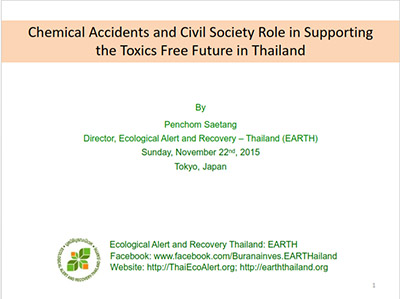
Chemical Accidents and Civil Society Role in Supporting the Toxics Free Future in Thailand
By Penchom Saetang, Director, Ecological Alert and Recovery – Thailand (EARTH)
22 November 2015
Chemical accidents in Thailand: a case of Klong Toey chemical explosion, National Strategic Plan on Chemical Management, and the key challenges under the National Strategic Plan on Chemical Management
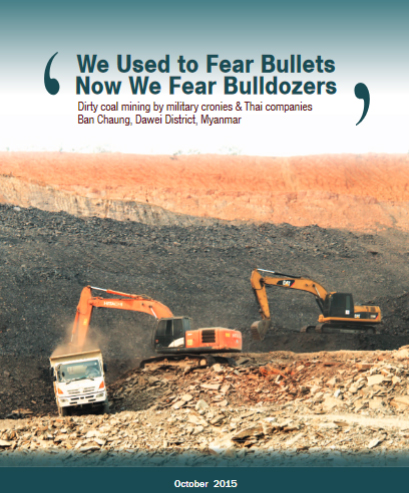
We Used to Fear Bullets, Now We Fear Bulldozers: Dirty coal mining by military cronies & Thai companies Ban Chaung, Dawei District, Myanmar
By Tarkapaw Youth Group, Dawei Development Association (DDA), and the Tenasserim River & Indigenous People Networks (Trip Net), October 2015
This report documents the environmental and social impacts of the Ban Chaung coal mining project in Dawei District of Myanmar’s Tanintharyi Region - the serious harm that has already happened to villagers’ health, livelihoods, security, and way of life, and the devastating contamination of local rivers and streams. Although local people are opposed to coal mining, they were never given the chance to voice their concerns; only knew about the project once the bulldozers started digging on their land. Now the villagers have joined hands to challenge irresponsible coal mining in their area, they call for alternative, democratic, and inclusive development in Tanintharyi Region.<
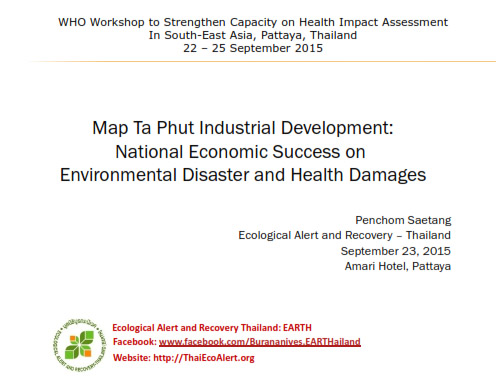
Map Ta Phut Industrial Development: National Economic Success on Environmental Disaster and Health Damages
By Penchom Saetang - Ecological Alert and Recovery – Thailand (EARTH)
23 September 2015
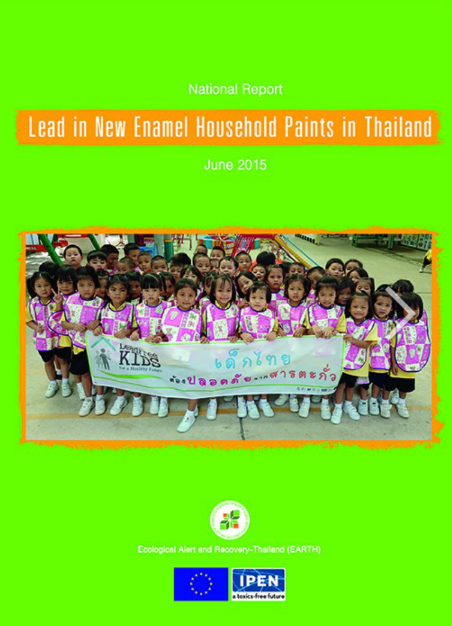
Lead in New Enamel Household Paints in Thailand
Ecological Alert and Recovery - Thailand (EARTH), European Union, IPEN, June 2015
Leaded paints for home use continue to be widely produced, sold and used in developing countries despite the fact that most highly industrial countries banned leaded house paints more than 40 years ago.
In 2007 and 2008, NGOs in the IPEN network collected and analyzed decorative (home use) paints on the market in 11 developing countries, and in countries with economies in transition. The results were startling. In every one of these countries, many of the paints had dangerously high lead content. In response, IPEN launched a worldwide lead paint elimination campaign. Since then, IPEN-affiliated NGOs and others have sampled and analyzed paints on the market in approxima
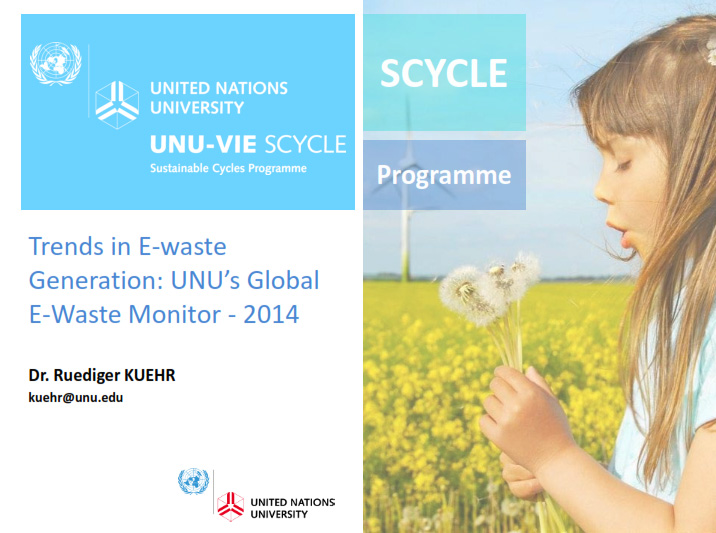
Trends in E-waste Generation: UNU’s Global E-Waste Monitor - 2014
Presentation by Dr. Ruediger KUEHR, United Nations University
At the Conference of Parties - 2015 Geneva, 11 May 2015
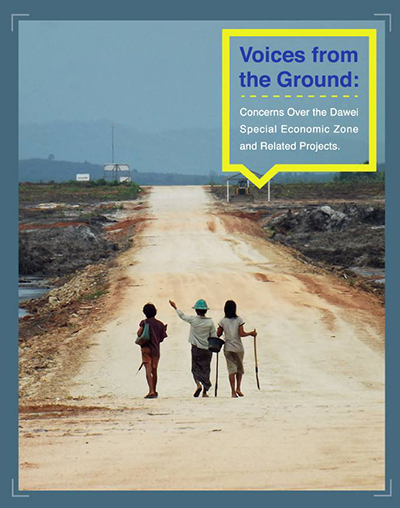
Voices from the Ground: : Concerns Over the Dawei Special Economic Zone and Related Projects
Dawei Development Association (DDA), September 2014
This report examines the Dawei Special Economic Zone (DSEZ) project in Southern Myanmar, which, if realized, would be one of the largest petrochemical industrial estates in South East Asia. It presents the results of a quantitative and qualitative study, aimed at understanding the process by which the DSEZ project has unfolded, and the extent to which the rights of the local people are being protected and respected by the relevant States and corporations in the implementation of the project.
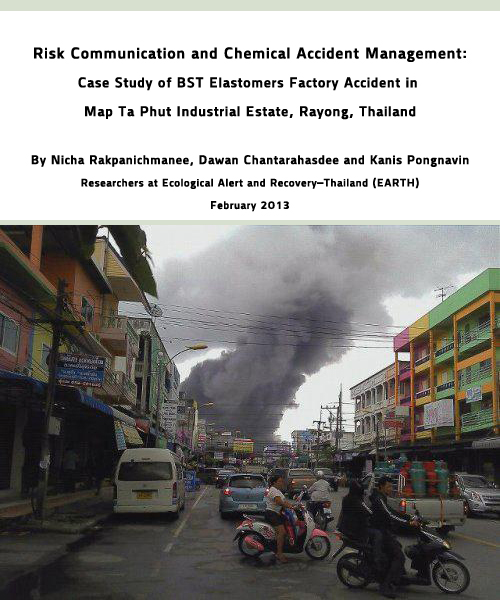
Risk Communication and Chemical Accident Management: Case Study of BST Elastomers Factory Accident in Map Ta Phut Industrial Estate, Rayong, Thailand
By Nicha Rakpanichmanee, Dawan Chantarahasdee and Kanis Pongnavin - Researchers at Ecological Alert and Recovery – Thailand (EARTH), February 2013
Thailand in a time of rapid industrialization has witnessed increased risk from chemical accidents and industrial pollution. The objective of this study is to review the existing approach of risk communication and chemical accident management in Thailand. We analyze risk communication in practice according to the principle that risk communication is not a product of scientific calculation, but a process of negotiation and deliberative agreement in society.


